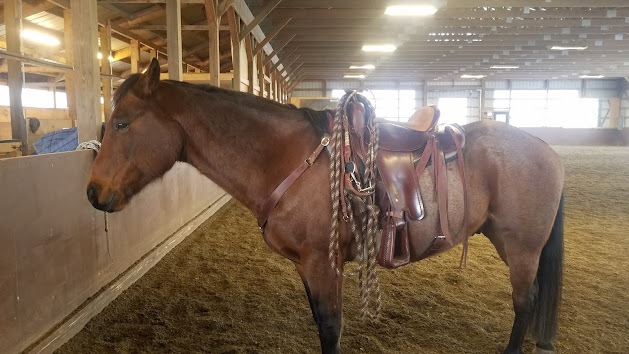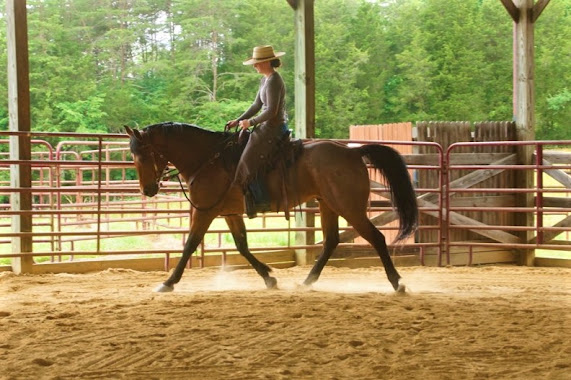One of my students recently asked me about liberty work. The question was along the lines of how I felt about it/whether there was value in it from the perspective of the horse's education.
I try really, really hard not to comment on particular horsemanship practices if I can help it. When I do, it's usually because someone has specifically asked my opinion. I won't lie, but I also have zero interest in my opinions becoming the basis on which my students build their horsemanship so I try and give an answer that is as neutral and fact/experience-based as possible. I don't have all the answers and I don't want to purport that I do. I have just found a few things that have worked for me enough that I feel confident offering the information to others.
I quite enjoy liberty work, but not for the reasons so many other horse people seem to like it. I don't consider liberty work to be a genre in and of itself: it's a tool, like so many other practices, and can yield valuable information about my relationship with a horse.
Note that last part, because it really describes the crux of my feelings on the subject. Simply because a horse is loose does not mean he is doing what you ask willingly. It goes back to the fact that horses will look for the path of least resistance in order to remove a pressure, but if that path is not something they choose freely then that "choice" is going to come with a degree of resentment. The beauty in liberty work is when the horse realizes he has the absolute choice - and is free to exercise that choice without punishment or retribution from you - but chooses to stay with you and actively participate.
That's how I use liberty work. If I break down an average session with a horse the same way I'd describe a meal, liberty is like a good appetizer. It's not what I come to dinner for, but it can be a nice introduction and when implemented appropriately serves to enhance the main course.
I stepped back to take this picture the other day of Soni. I often bring him into the arena to tack up: however, this is not a picture of Soni allowing me to tack up, but a picture of Soni actively participating in being tacked up by choosing to stand and wait for me instead of meandering the arena, having a good roll, visiting a horse on the cross ties, etc.
This is most often how I use liberty work: I set up the question and the horse is free and able to choose whether he stays with me or leaves. I want to know this before I go to swing on his back - if he's going to leave, I'd rather him do it without me on him. Tacking up with the horse loose is a wonderful test to see how your horse feels about the saddle, the bridle, about being asked to go to work, about being asked to go to work with you. It can be quite humbling the first few times: that horse that stood stock still on the ties is now whirling away from you when you turn to lift the saddle pad onto his back. It makes it awfully tempting to rush to get the halter again.
But if how my horse feels about what we're doing is priority #1 then I want to know the truth, even if it makes my stomach tighten and my heart drop.
When I first went to see Harry, I found out just how poorly Soni felt about a lot of things. None of it was stuff I'd created but I hadn't addressed it either. To halter Soni, I'd approach him at the shoulder, loop my right hand over his neck to bring his head towards me and catch his nose in the halter in my left hand. I'd haltered horses this way for years. But as Harry pointed out, if I approached Soni head on and presented him with the halter, at best he'd swing his head to the right to avoid it. At worst, he'd immediately leave. Sometimes he left with quite a lot of momentum; it all depended on how worried he felt that day. The whole time I'd known him I'd been missing the fact that I was trapping him with the halter. Literally. I'd been missing the fact that even while I was trapping him, he'd been swinging his head and neck to the right to avoid being haltered. The fact that he didn't rear and whirl and run away but just simply turned his head away from me told me two things: he didn't feel badly enough about being haltered to escalate, but he carried enough worry about being approached to be caught that he couldn't stay centered and participate in being caught.
What we often fail to understand as riders is that something being "over and done with" doesn't remove any concerns or resentment the horse might have had about it. The halter making it on Soni's head didn't alleviate him of that uncomfortable feeling - those feelings are now the base layer for every interaction I had with him in that session. A royally crappy appetizer has the distinct potential to spoil a meal: even if the main course is great, you're going to have a hard time forgetting about the horrible start. You might even get quite apprehensive about the next course. The dessert might wind up being to die for, but that likely won't be what you remember at the end of the night.
So it goes with the horse, and it's in this capacity that I utilize liberty work. It's not simply a series of tricks I put my horse through to prove a point or impress a crowd. It's a starting point of a conversation between my horse and I, one where I am openly inviting him to tell me: how do you feel about this? Can you stay with me if I ask it of you? Or do we need to work through this a bit more so you feel better about it?
Soni still needs some help feeling okay with something being put on his face at times. He'll walk up to me in the pasture and follow me around the arena but will immediately swing his head to the right as soon as I so much shift the halter or bridle in my hands. It's as conditioned a habit in a horse as I've ever seen to the point where it appears entirely reflexive. I would be foolish to believe this is the case, though. It's not reflexive; it's not that Soni doesn't trust me at this point, he just continues to need that little reminder - some support, if you will - that he's not going to be hustled. He needs to be reminded that I asked for his feedback and I'm not going to ignore or dismiss it.
THIS is the real value of liberty work: done right, it's a conversation formed without demands or compunction. It offers a platform for the horse to tell us what matters to him and gives us the opportunity to fix it for him on the deepest level possible. In truth, it's a long walk on the quickest pathway to honest connection with these animals.
Done wrong (or for the wrong reasons) it's just another gimmick.


Great post, thanks Abby! I'm working toward this with Scotty, in the early stages now!
ReplyDelete